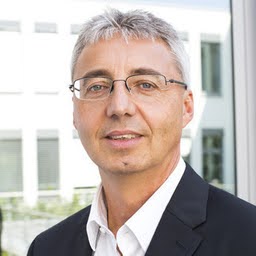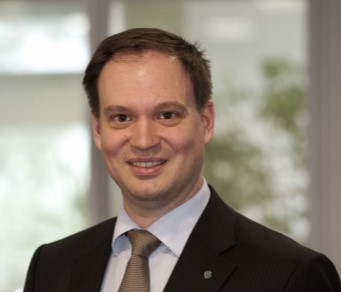Wed 4 SepDisplayed time zone: Amsterdam, Berlin, Bern, Rome, Stockholm, Vienna change
08:00 - 09:00 | RegistrationSocial | ||
09:30 - 10:30 | |||
09:30 60mKeynote | Thorsten Berger "The Virtual Platform: Re-Thinking Variability" Keynotes | ||
Thu 5 SepDisplayed time zone: Amsterdam, Berlin, Bern, Rome, Stockholm, Vienna change
08:00 - 09:00 | RegistrationSocial | ||
09:00 - 10:00 | |||
09:00 60mKeynote | Jürgen Hamm "Exploring Collaborative Innovations: Digital Twins and Architectural Challenges" Keynotes | ||
Fri 6 SepDisplayed time zone: Amsterdam, Berlin, Bern, Rome, Stockholm, Vienna change
08:00 - 09:00 | RegistrationSocial | ||
09:00 - 10:00 | |||
09:00 60mKeynote | Ralf Reussner "Software Engineering – Quo vadis?" Keynotes | ||
About
Jürgen Hamm
Affiliation: NetApp Twin Solution

When: September 5, 2024
Title: Exploring Collaborative Innovations: Digital Twins and Architectural Challenges
Abstract: Digital Twins (DTs) offer significant potential for optimizing, analyzing, and adapting complex engineered systems, particularly post-deployment. They leverage historical data and real-time streaming data from sensors to achieve these objectives. As the adoption of DTs grows, ecosystems of digital twins emerge. Multiple DTs may serve different goals, represent various components in an architecture, embody different levels of detail, abstraction, or fidelity, and be applied at both type/aggregate and instance levels. This talk will present how NetApp has been addressing these challenges with its partners, emphasizing the key motivations behind NetApp's sustained collaboration with Fraunhofer IESE, which focuses on utilizing architecture robust DTs for various architecture-centric engineering objectives, including anomaly detection, predictive maintenance, and optimization to address broader business drivers such as financial considerations, time-to-market pressures, and competitive dynamics that shape industry strategies. Attendees will gain insights into how industry-research partnerships can drive technological innovation and address critical quality requirements, including security, scalability, portability, automation, and sustainability.
Bio: Since March 2012, Jürgen Hamm has been holding the position Solutions Architect SAP EMEA at NetApp Germany. In this role, Hamm focuses on consulting customers and partners on IT-infrastructures, network technologies, SAP technologies and virtualization. Hamm builds cross-functional teams to secure the successful execution of SAP-related customer projects in EMEA. Since 2018, Jürgen Hamm is also, Lead Architect NetApp Twin Solution. In this role he is promoting the development of NetApp’s value offering in the Internet of Things (IoT), thus expanding opportunities with new groups of customers and broadening NetApp’s go-to-market. The IoT solution “NetApp Twin Solution” is just one example of multiple solutions and demos that Hamm set up to showcase and proof NetApp’s role in the IoT market. Before joining NetApp, Jürgen Hamm worked as a technical consultant at IT consultancy GOPA. He started his career as SAP technology expert at Novasoft in 1998. Jürgen is a state-certified technician in the field of automation and production engineering.
Ralf Reussner
Affiliation:University of Karlsruhe

When: September 6, 2024
Title: Software Engineering – Quo vadis?
Abstract: The increasing role of software in technical innovations offers new opportunities for software engineering as a discipline. In this keynote Ralf Reussner presents a SWOT analysis of our field. Strength have usually created through importing concepts from other disciplines, like the term architecture. In the keynote software architecture-based analysis is treated as an example of an engineering approach in software design. Opportunities are given through software engineering methods helping in challenges of systems engineering, from view consistency and model analysis to the handling of versions and variants. This means that software engineering can also play a central role in system development in terms of providing new software engineering originated systems engineering methods. However, this is threatened by the increasing trend to primarily optimise the acceptance of the next conference paper without any further scientific vision. This focus on the next published paper may seem to help us optimise our own careers, but -- as substitute for a research strategy and vision -- misses the opportunity to further develop our discipline.
Bio: After studying computer science at the University of Karlsruhe (T.H.) and receiving his doctorate there in 2001 Ralf Reussner worked as a senior research scientist at DSTC Pty Ltd in Melbourne. From 2003 he was awarded with a junior research group "Palladio" within German Science Foundation Emmy Noether Excellence Programme while being one of the scientific directors at the OFFIS-Institute for technology transfer and Junior Professor at Ubiversity of Oldenburg. At the age of 33, he accepted an offer for professorship (W3) in software engineering at the University of Karlsruhe (T.H.), later declining offers on full professorships from Universities Osnabrueck, Hamburg and TU Munich. In summer 2006 he was appointed as the youngest director of the FZI Research Centre for Information Technology in Karlsruhe. 2011-2017 he was member of the Executive Board of the FZI. Ralf was co-founder of the "International Conference on the Quality of Software Architecture" series in 2005, one of the pillars of today's "International Conference on Software Architecture". Since 2023, Ralf Reussner has been the spokesperson for the newly established special research area Convide - Consistency in the View-based Development of Cyber-Physical Systems, where he researches on consistency between views in the development of software-intensive systems together with over 70 scientists from TU Munch, TU Dresden and U Mannheim.